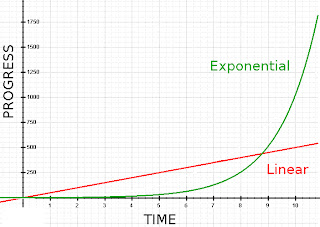I was going to post about, the plastic formation the size of Texas in the Pacific known as 'The Great Pacific Garbage Patch," but that will have wait until my next post. This delay happened because I've been reading a fair bit of Steven Pinker and was looking through new comments and found something peculiar, yet it strangely matched up with what I've been reading.
AhmTaGoji was writing about what it would mean for a computer to pass the Turing Test and said that,
"What I was trying to say was that no matter how convincing or uncanny of a performance a computer does during a Turing test is only evidence of the what the test attempts to prove: that a human can be fooled about conscious identity via a computer screen. The computer would have to go much further than to fool one human about his identity, he would have to, for a lack of better words, fool himself. Long after the Turing exercise, if the computer learns from his experiences and starts asking itself questions like 'What am I doing here? How did I get here? I'm human aren't I? Or what am I?', and begins to autonomously prepare himself in the anticipation of future experiences, then he isn't yet conscious."
That's a funny, yet prefect way of putting it, 'The computer would have to go much further than to fool one human about his identity, he would have to, for a lack of better words fool himself.'
Besides the assumption that the computer is a man, I think that's a great understanding, because the more I read about consciousness, the more that fooling ourselves seems to be what we do as well. That act of the mind fooling itself and giving itself a coherent reason for doing the things is a large part of what it is to be 'human' and would also be a large part of what it would take for a lot of people to consider a computer program sentient.
The Blank Slate, when talking about how the self is just another network of brain systems, on pages 42-44, gets into talking about how the brain tricks itself to give it a reason for doing certain things. This trickery can most dramatically be shown in people who have their corpus callosum cut (the thin layer that connects the two hemispheres of the brain). It can literally be described as cutting the self in two, and each part acts independently while the other half juggles to make sense of what is going on.
The example is given where an experimenter shows the word walk to the right hemisphere (by keeping it in the part of the visual field that only the right hemisphere can see and the person will comply and begin to walk. Admittedly not that interesting yet, but a strange thing happens when the person is asked why he got up and started walking (language is in the persons left hemisphere). The person doesn't say that, "I just got a feeling to" or that "Since my surgery where my corpus callosum was cut I do things without knowing exactly why."
Instead they say, in complete sincerity, that they were going to get a coke. They manufacture a logical reason for what they were doing, where it can be objectively shown that the reason was different.
That's the trickery coming in and Pinker concludes that, "The spooky part is that we have no reason to think that the baloney-generator in the patient's left hemisphere is behaving any differently from outs as we make sense of he inclinations emanating from the rest of our brains. The conscious mind- the self or soul-is a spin doctor, not the commander in chief."
While AhmTaGoji's point may be that for someone to consider a machine to be 'a person' the machine would have to do more than talk, it would have to claim adamantly for itself that it was a person, it also connects very well with the fool inside all of us.
Happy Spinning,
-the moral skeptic




